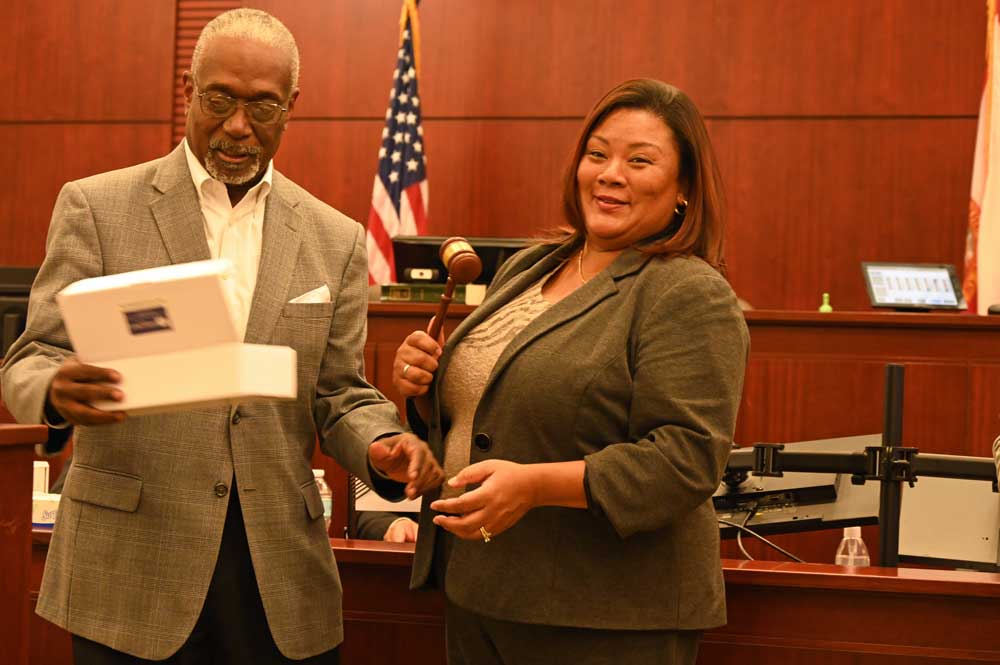
Adrianna Laforest, the Palm Coast attorney and president of the Joseph W. Hatchett Bar Association, introduced Judge Alicia Washington with quite the subtle dig at the nearly all-white power structure–some of it in the audience–that Washington had tried in vain to crack, until voters and her persistence powered her through.
“After 11 unsuccessful attempts to secure a judicial appointment,” Laforest said to an audience of about 70, including at least nine judges, and referring to the number of times Washington sought appointment to the bench through a highly political process, “Judge Alicia Washington was elected by the people to the bench in August of 2020, making her the first African American female circuit judge in the Seventh Judicial Circuit, which consists of Volusia, St. Johns, Flagler and Putnam County. She currently presides over the unified family court in Putnam County, making her the first African American judge to ever serve in Putnam County.” (Washington’s current exile to the Siberia of the circuit has mostly to do with lack of seniority.)
Washington’s rejoinder was no less pointed: “I’ll be honest with you,” the judge and long-time Flagler resident said in what was to be only one in a series of arresting sidebars by the speakers, “I stay amazed that in this country, in 2022, we are celebrating firsts. I’m always amazed by that. So I put more stock in not being the last than being the first. I just hope that somebody looks at me and says: I could do it too.”
The comment dovetailed into a briefly emotional moment for Circuit Judge Raul Zambrano, the Panama-born judge who’d presided over felony court for two years in Flagler before being reassigned to Volusia, and who has often made a point to downplay racial or ethnic differences without ignoring them. He told the audience of an encounter he’d once had on the fourth floor of the Flagler courthouse after hours.
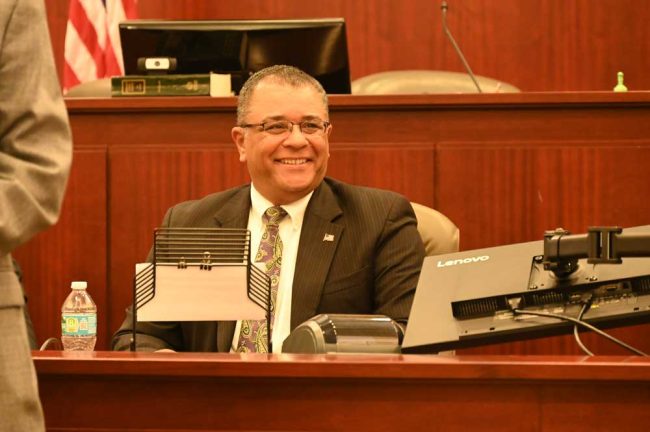
“The cleaning lady who was Hispanic, was cleaning,” Zambrano told the audience. “And you know, I never thought of myself as the first of anything. I think they categorized me as the first Hispanic judge, but it to me doesn’t make any difference. I just consider myself a judge just like everybody else.” He pointed to the judges sitting in front of him–Flagler’s entire Seventh Judicial Circuit bench: County Judges Melissa Distler and Andrea Totten, Senior Judge Terence Perkins, Circuit Judge Chris France, and from St. Johns, Circuit Judge Kenny Janesk. All white. (The sum total of the circuit’s Black legacy was sitting behind him.)
“And I didn’t realize the impact me, my personality, having [on] others, Hispanics. So it was that Hispanic lady who kind of brought it to the front to me, because as I was walking out of the building, I could tell she wants to speak with me. But she was afraid. So I said to her, you know, how are you? How are things are going? And then she said something very profound. She says: one of us made it.” Zambrano choked. He was not alone. “You know, and that–that taught me that folks that look like you look up the and it makes a big difference.”
Washington, Zambrano and Laforest were among the speakers at a quietly historic event at the Flagler County courthouse Monday evening. Dubbed “A Night of Celebration,” Dwyer and Knight, the Flagler Beach law firm, and Evolve magazine–both Black-owned Flagler County businesses–had organized what amounted to an investiture redux, with an edge.
The event, held in a first-floor courtroom, recognized the “historic accomplishments” of Washington, Judge Joan Anthony, who was also elected to a Seventh Circuit judgeship in a first for a Black woman (she presides over family court in St. Johns), U.S. Supreme Court Justice Ketanji Brown, the first Black woman to serve on the U.S. Supreme Court (she began her first term Monday), and Florida Supreme Court Justice Renatha Francis, only the second Black woman, and–just as dismally–only the sixth woman overall, to serve on the state Supreme Court.
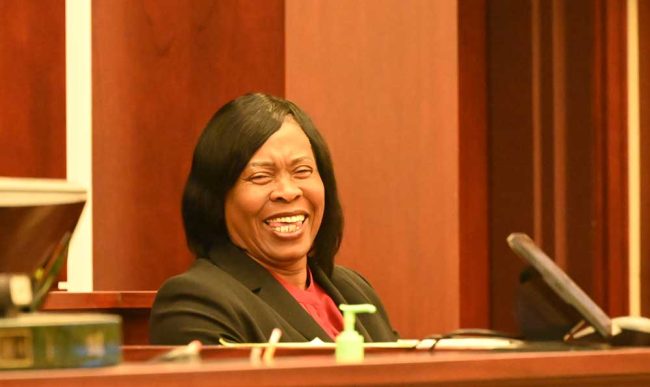
“And so tonight is our night, Flagler county’s night to take our victory lap,” attorney Mark Dwyer of Dwyer and Knight told the crowd at the beginning of the hour-long celebration, “because Flagler County played a very important role in the election of 2020. And as I sat at Bethune Cookman at the investiture of these two judges, and watched Volusia County basking in their glory, having the opportunity to celebrate and rejoice together, I felt that we needed to have the same here in Flagler County. And so from that day, we were determined to welcome our judges to Flagler County. And that’s what we’re here to do tonight.”
At the beginning of every court session in every American courtroom–from traffic court to the Supreme Court–a bailiff calls out the “all rise” order as the judge walks in. This time, and probably for the first time in his career in Flagler, it was Flagler County Sheriff Rick Staly who boomed out the order: “All rise! The honorable Alicia Washington and the Honorable Joan Anthony presiding,” he said as the two judges walked in and took their seats on the bench.
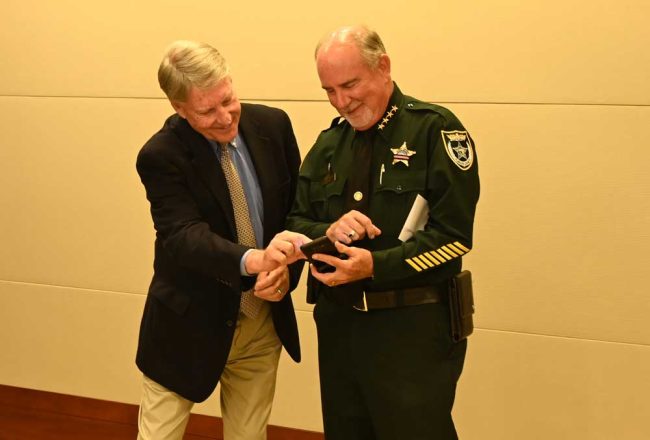
In front of them, arrayed where deputy clerks usually sit, were retired Judge Hubert Grimes, who had been the circuit’s first Black judge when Jeb Bush appointed him in 1999 (he went on to win elections and serve until 2014), Zambrano, Dwyer, Stephen Knight and Howard Holley, publisher of Evolve.
Obviously Justice Jackson was not part of the ceremony except through a showing on overhead screens of her swearing-in. But Dwyer had a surprise. He dialed Justice Francis on his phone, and there she was, addressing the new judges presumably from Tallahassee: “Judges Alicia Washington and Joan Anthony,” Francis said, “congratulations on your historic accomplishments of being the first elected African American judges in the history of the Seventh Judicial Circuit of Florida. That is quite an achievement to be proud of. And I know like I’m sure you do that we stand on the shoulders of African American women who have gone before us. I am sure that you will both serve with distinction in this very important role. And congratulations again. Very well deserved.”
The formality had its limits. With so many judges per square inch, first names were flying. “Since we are on a first name basis, I want to say thank you, Raul,” Grimes told Zambrano after his introduction before quickly noting the day’s other commemorative date–Oct. 3–as the day Mary McLeod Bethune opened the Daytona Literary and Industrial Training School for Negro Girls, what is now Bethune-Cookman University.
Grimes summarized Jackson’s biography before pausing to “honor a woman who worked hard throughout the course of her life, took on challenges that others thought were impossible, even going back to those high school days when she had a guidance counselor that seemed to think she should lower her sights. I pray that none in this room and none of our young people will ever accept that particular designation. Never lower your sights. Continue to believe that you can accomplish great dreams. We see that locally here in the form of our two judges that we’re going to be honoring this afternoon.”
Anthony spoke of her lineage– her father who cut sugar canes for 50 years, both her parents “who couldn’t read and write, and here I stand. I’m one of these judges that I used to stand in front of and beg,” she said, recalling her days as an attorney. “That just gives me so much pleasure to know this courtroom that I walked in, to beg judge Perkins, you know, just [arguing] for your clients, I just have to say to Flagler County: Thank you, thank you, thank you.” She was especially thankful for the votes after spending just three days in the county during her campaign.
The sense of accomplishment extended to the Joseph W. Hatchett Bar Association, established a decade ago “to foster and encourage professional excellence among minority lawyers in the seventh judicial circuit,” as its mission statement reads. The association (an affiliate of the Virgil Hawkins National Bar Association), is named for the first Black Justice to serve on the Florida Supreme Court, from 1975 to 1979.
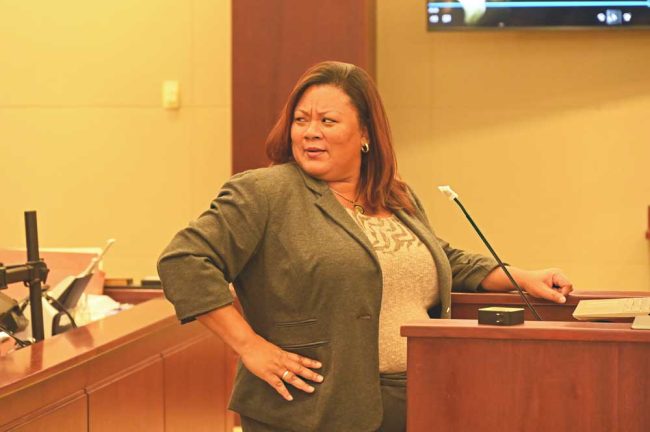
Zambrano reminded the crowd that it isn’t always “a good thing” to be a judge (it’s not for nothing that judges and their families’ home addresses are exempt from public record laws). He called a tree company for some debris removal in the aftermath of Hurricane Ian. “When they showed up, the first thing they say is: Judge Zambrano, thank you for letting me out in jail.” He added: “I don’t know how many of you have been placed in the position of having to make decisions about other people’s lives, and it is very impactful on the human being.” It was then that he told the story of his encounter with the Hispanic cleaning lady, going on to make his larger point about the judiciary’s responsibility regarding equality of justice no matter the person’s characteristics.
It had happened in the very same courtroom where he was speaking Monday evening. Two children, one white, one Black, caught stealing at Target. The State Attorney offered the white child a “non-judiciary disposition,” meaning no incarceration, no criminal record. That was fine, Zambrano said. It was a first offense. Most adults in similar circumstances, even on a first, low-level felony, are spared incarceration and have their adjudication withheld, also sparing them the designation of a felon. Doing the same for children is routine.
But the Black child was offered probation. “I said well, wait a minute,” the judge recalled telling the prosecutor. “Why they both got caught together doing the same exact thing, are they been offered different things? And they said well, the Black child was the mastermind.” Zambrano didn’t buy it. He’d read both charging affidavits. They were identical.
“So either we bring the white child up and give her probation, or we take the Black child and give her a non judicial disposition,” Zambrano said, “because that’s what equality is about. And that’s what we’re here for. To make sure that everybody gets treated in an equal fashion. And it’s not often that that occurs, but whenever an opportunity that we as judges see inequality, it is our duty to make sure that the field is level, that no one has a leg up on anybody else.”
![]()
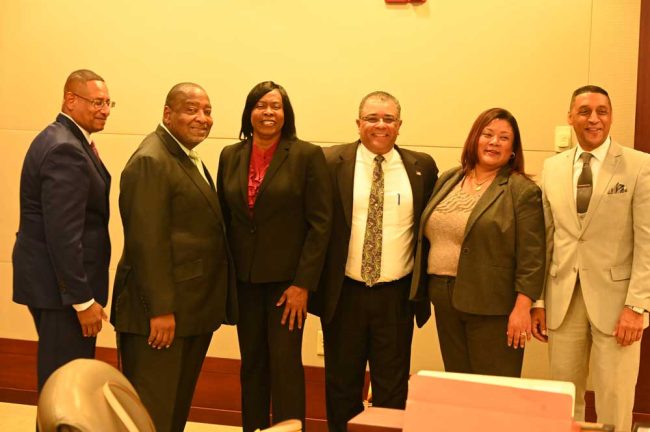





























Bill C says
Hooray for these judges, very inspirational! By the way Supreme Court Justice Katanji Brown Jackson rose from adverse circumstances as well, and her elegant, sophisticated and dignified persona, make Kavanaugh, Gorsuch and Barrett look like entitled self absorbed brats, when compared to her.